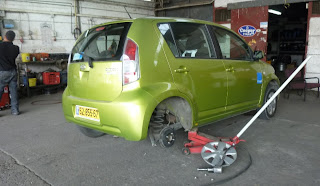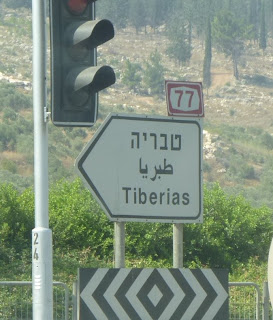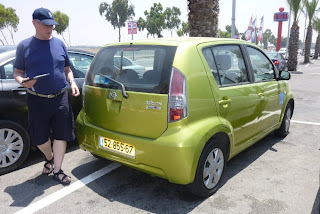Today marks a full week that we have been in Israel and both of us have fully adjusted. Howard had not been here for 2 years, so he was excited to be back, and he is getting more involved more quickly....napping a bit less as we also have an extra room with air conditioning!
After a lovely restful Shabbat in Shuval with our friends Haim and Shunamit, we visited friends in Kibbutz Beit Kama Saturday night. Our friend recently moved back to the kibbutz where he grew up. His father is still very much of a kibbutznik, working in agriculture. He used to work in cotton, but it is no longer grown beause of the amount of water needed. The mother teaches at a university in Beersheva and is also a midwife. Their other child also recently moved back to the kibbutz. I'm envious. It iswonderful to have grandparents and siblings with their young children so close by.
Beit Kama is also going through a kind of privatization. The dining room is only open during the day, but because of requests, it will now be open one Friday night a month for a community Shabbat dinner. Most of the businesses have been outsourced or are done in partnership with another kibbutz. There are two new building areas for homes. One is for returning "children" of members like our friends. They are hoping to keep the same "feeling" of the kibbutz with homes that are not too big and nature surrounding them. The other new building area is for people from "outside." Their homes are definitely bigger... Howard and I like our friends prefer the older format!
This picture above is of very tall Yucca plants along the side of one of the older houses. They must help keep the home cool in summer.This picture belowshows how a new leaf is added to this fiscus tree. It starts as a red casing which gets bigger, splits open, and then becomes a leaf.
We’ve kept busy since we arrived in Kiryat Malachi on Sunday. Aside from Howard’s knee, we are feeling pretty good (as long as I take a Benedryl before going to bed).
We’ve been to two supermarkets and to the local shuk, which is just across the street. (I am always surprised at how expensive food is here in supermarkets.) The shuk (market) is open on Mondays and Thursdays, and on Thursday (today), it is mainly a food market—fruits, vegetables, and nuts. I came home today with my arms loaded with a watermelon, an Israeli melon (not as orange as a cantaloupe), a ½ kilo of fresh figs, tiny pears and small peaches, etc. I’m going to go back for fresh almonds in their original (green) casing and maybe some more fresh lychee. You can see below the almonds I bought when I did go back. The green shell is the actual shell of the almond. What we know as the brown shell is actually soft at first and then starts to harden. The taste is similar to that of almond flavoring...different from dried almonds. (BTW, when I went back at 6 p.m., some of the produce venders had lowered their prices substantially....a good time to shop for bargans. For examples, cucumbers were down from 1.5 shekels a kilo to 1 shekel per kilo (i.e. 28 cents for 2.2 pounds).


Howard has been busy this week and has gotten involved in 3 different places.
First of all on Sunday we together when to a program called Tzeva. It is an enrichment and homework after-school program during the school year to help some lower income children. Several national service young women volunteer there during the year. (They are Orthodox teens, recent high school graduates, who do this service instead of the army.) 2 days a week third and fourth graders attend, and another 2 days 5th and 6th graders attend. This summer, they have a three-week program, but just 2 days a week, Sunday and Monday. The coordinator, Merav, is great. She works very well with the children. Unfortunately, she doesn’t have enough volunteers to run it more days.
On Sunday, when we first went, there were 3 young women from national service came, plus another woman named Hadar who I later found out was Dvora’s daughter-in-law. She first got involved with Tzeva through a college community service class she took at Achva college, a program that our TIPS partnership once sponsored. She liked Tzeva so much that she continues to volunteer some. The next day, however, Howard was the only volunteer. The program has a set of "golden rules:"
Don't abuse others; be respectful; come on time.
One ten-year-old boy named Ben latched on to Howard right away. Ben’s mother is French, and Ben speaks French and some English with her too, so he was excited to talk English with Howard, and his English was good extremely good for someone his age.
Howard also played hopscotch with the kids during a recess. The next day, a petite Ethiopian girl, also the same age, came just because she knew Howard was there. Her English was good too—mainly from watching TV programs in English.
Howard painted with Q-tips with the kids while I did word searches in Hebrew on the topic of summer with others. Later, during large group activities, we learned the game “Yahm-Yavesha.” It is like a very simple Simon Says. There is a line in the room. One side is “yahm” (ocean) and the other is “yavesha” –dry land. When the leader shouts one of the words, each participant has to jump to the correct side.
We then played a bit of non-competitive volleyball as well as other games. One boy, David, was acting out destructively so he was sent to another alcove. Howard went over to him and calmed him down with a bit of attention—they compared watches.
Howard also helped an 11th grade girl named Sara prepare for the top level (5 pt) repeat Bagrut exam in English (like the SAT subject exams). She is in the alternative school program (Beit Novea)—less formal than in the US. She’s also Ethiopian and has learned a lot of English from TV too. Last year, when she started at Beit Novea, they didn’t know what test for her to try. She took the 3 pt exam and scored 100%. She’s quite sharp so I’m glad that she found her way back to a school program. (This is a program that Shalom Eldar from our TIPS steering committee helps administrate.)
Atidim is a special program program to help disadvantaged youth prepare to become army officers. It starts with youth as young as 7th graders and teaches them many good life skills. The director for the local program in town wanted to run an English class for outgoing 7th graders, and because Howard was here, she could start it. Yesterday (Wednesday) was the first day. Howard had about 7 or 8 girls and one boy. The girls in skirts were from the religious public secondary school AMIT, and the others were from AMAL, the non-religious public school. He really is a born teacher, and it showed here from what he told me. He got the kids to talk a bit about their interests. He found out that they liked romantic movies. So he told them about the most romantic movie he has ever seen, “Casablanca.” He told them the story, briefly, but did not tell him which of the 2 men that the main star chose. (The teacher may get the movie so that he can show it to them and use it as a teaching tool.)
Howard also found out that they wanted to do vocabulary work, so they reviewed everything they could see in the room. New words that he taught included “elbow.” Then in the afternoon, we went to the library and took out 4 picture dictionaries that he could use with vocabulary by topic. I am so well known at the town library that they let us take the books, though the usual limit is just 2 books at a time.
He said that some liked to talk and others liked to listen, and he was happy to let them do either. They don’t want to do “activity book” work, and neither does he!
Last night Howard downloaded a bunch of pictures to his new IPad to take to class today, and the girls enjoyed seeing them. Three new people showed up today but the one boy was missing.
It says a lot if so many show up the second day….during summer vacation to a non-required class. He will continue next week from 10 a.m. to noon, but with 2 smaller groups, the AMIT group first and then the AMAL group. The AMIT girls want to practice writing, and came prepared today with notebooks and pencils. I’ll be happy to help him with writing starting on Sunday.
Last Monday, we went over to the new open mall just across the highway from town (about 4 blocks from us). In the side area of the parking lot, adjacent to MacDonalds and Cafe' Joe, there was Israeli dancing in the parking lot.


Ira (on the left in the 2nd photo) stayed for several hours, and I also ran into Esti, the science center administrative assistant. Esti invited us to go with her on Wednesday to participate in the walk with Gilad Shalit’s family to Jerusalem. It started at their home in the Galil (Galilee) and by Wed. would be at Latrun. I knew I had to work with Ira on the TIPS calendar, and also was concerned about being outside in the heat of the day. Today, she told me it was a fantastic experience. They waited for 2 hours in the open sun, but then walked with the family for an hour. If you haven’t heard of the walk, it is major news here, taking over a week total. The idea is to get enough attention to at least improve the conditions for Shalit and for some communication to exist and health visits.
Howard also found out that lattes at MacDonalds at the mall were just as good as those at Cuppa Joe or Aroma and a lot cheaper! Howard picked out some Israeli style t-shirts (4 for 100 shekels, or about $7 each) at Tabun in the mall....
The TIPS Partnership (Tucson Israel Phoenix Seattle) that I’m co-chair of has had an annual art contest for 5th and 6th graders. This year the theme was partnership and the top entries from the 5 communities (Israel = Kiryat Malachi and Hof Ashkelon) are on display at the entrance to the town libraries. I’ve been helping to put together the format for the calendar that will be made for Israel this year. (The American communities have asked for note cards, something not used here in Israel as we do in the US.) I’ve been typing in Hebrew, and have gotten the basics down for touch-typing in Hebrew. I’m astounded!
News this week has included the following:
1) World Soccer cup (Yay Spain! The final should be fascinating though I still find it hard to believe that Brazil and Argetina dropped out so early.)
2) Traffic accidents--especially hit and runs....there have been more than 250 hit and runs so far this year leaving someone with serious injuries or killing the person hit
3) The march of Gilad Shalit's family to Jerusalem (mentioned earlier) (In the 12 days of the march, which ended today, a total of 110,000 people marched with the family.)
4) Netanyahu's visit to Washington
I'm working to see lots of people. Life here is always hectic, with schedules filled from morning to night, so we are working on scheduling. As one of our reps said, when living in Canada as a "shaliach" (Israel cultural rep) they had plenty of time to drink coffee but not a lot of friends to drink it with, but in Israel they have very very little time to drink coffee (i.e. free time) and many many people to drink with. Israelis are very open, and one can drop by without an invitation, but there is less and less time to do so.)
Our plans for Shabbat are in place and schedule next week is filling up. We are going to visit our friend Dalia in Menachemia , just south of the Kinneret, stoping at Neot Kedumim, the Biblical Landscape Reserve, on the way. We’ve never been there and it sounds fascinating. Check it out at :
http://www.n-k.org.il/public/english/index.htm
Shabbat Shalom,
Dina and Howard












.jpg)
.jpg)


























